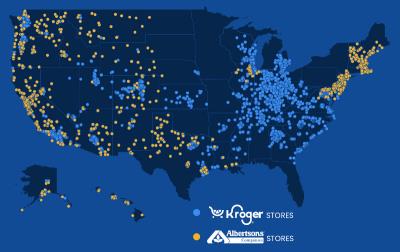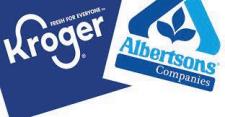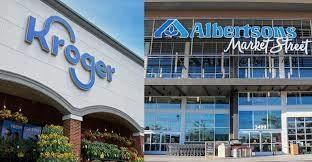 At first glance, a merger between the top and second ranked pure-play supermarkets would appear to conflict with Administration policy on competition. The announced acquisition of Albertson’s by the Kroger Company in a $25 billion transaction would create a behemoth with 4,900 stores. According to an analysis by J.P. Morgan, the merger could survive FTC scrutiny with divestiture of approximately 7 percent of each of the companies’ stores, given their relative location and overlap.
At first glance, a merger between the top and second ranked pure-play supermarkets would appear to conflict with Administration policy on competition. The announced acquisition of Albertson’s by the Kroger Company in a $25 billion transaction would create a behemoth with 4,900 stores. According to an analysis by J.P. Morgan, the merger could survive FTC scrutiny with divestiture of approximately 7 percent of each of the companies’ stores, given their relative location and overlap.
 If approximately 400 stores were to be divested, the combination of Kroger and Albertson’s would represent between 12 and 14 percent of total food sales, behind Walmart with a 22 percent share of the domestic food market.
If approximately 400 stores were to be divested, the combination of Kroger and Albertson’s would represent between 12 and 14 percent of total food sales, behind Walmart with a 22 percent share of the domestic food market.
Creation of a new single, large food retailer might have benefits for consumers, but at the expense of producers and vendors. Shareholders would benefit from synergy and certainly, Kroger would be able to leverage its investment in Ocada Fulfillment Centers through increased volume represented by the combined companies.
 The downside to egg producers will be greater leverage on price, delivery and payment terms and ESG pressure derived from the greater Kroger volumes of purchase. Finalization of the transaction may take at least a year, given the delays related to the Sanderson Farms acquisition by the Continental Grain and Cargill consortium. Production capacity in the U.S. egg industry should be restored by the third quarter of 2023, setting the stage for lower prices as occurred following the 2015 HPAI epornitic.
The downside to egg producers will be greater leverage on price, delivery and payment terms and ESG pressure derived from the greater Kroger volumes of purchase. Finalization of the transaction may take at least a year, given the delays related to the Sanderson Farms acquisition by the Continental Grain and Cargill consortium. Production capacity in the U.S. egg industry should be restored by the third quarter of 2023, setting the stage for lower prices as occurred following the 2015 HPAI epornitic.